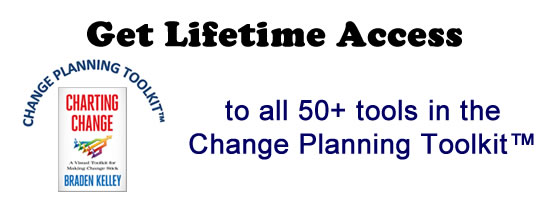You Don’t Have an Innovation Problem, You Have a Trust Problem! (Part 2)
Through my 2008-10 doctoral research, I found that the biggest problem that non-innovative companies have is lack of trust. In fact, whenever I was invited to speak to a company about their innovation needs, it didn’t take more than 20 minutes and 16 questions to find that they don’t have an innovation problem, they have a trust problem, and because of that, they have an innovation problem. The innovation problem is a symptom, not the disease.
So in 2015, I founded the Innovation Culture Institute, and started conducting additional research, which I want to share with you here.
In 2018, I conducted the Innovation Culture & Trust survey, and in this article I am sharing with you some of the highlights of the first part of that study, linking trust to innovation culture and innovation. In the survey, I asked participants whether they worked with a colleague who they trusted, one who they didn’t trust, and a boss. For both types of colleagues I asked the exact same set of questions, and a slightly modified one regarding their bosses. Here are some of the findings.
First of all, I found that wherever an environment of high-trust was described (the participant trusted both colleagues and their supervisor, and reported being trusted by those as well) the reported levels of both innovation and productivity were 64% higher, as shown in Figure 1. That, of course, is an indirect link between the level of trust and the outcome (innovation and productivity). However, this link goes through the elements of innovation culture, both at the vertical, hierarchical dimension and the horizontal, teamwork dimension.
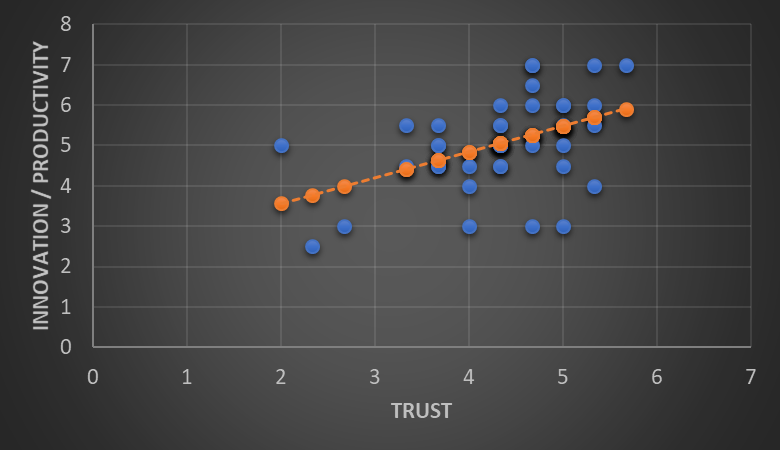
Figure 1
On the vertical axis, for an employee to be creative and productive, he or she must be getting autonomy from their boss. Where participants reported that they believed their bosses trusted them, they also reported having 67% higher autonomy to do their job, as Figure 2 shows. They didn’t report having the autonomy to choose what task they will work on, but rather the autonomy to decide how they will perform that task.
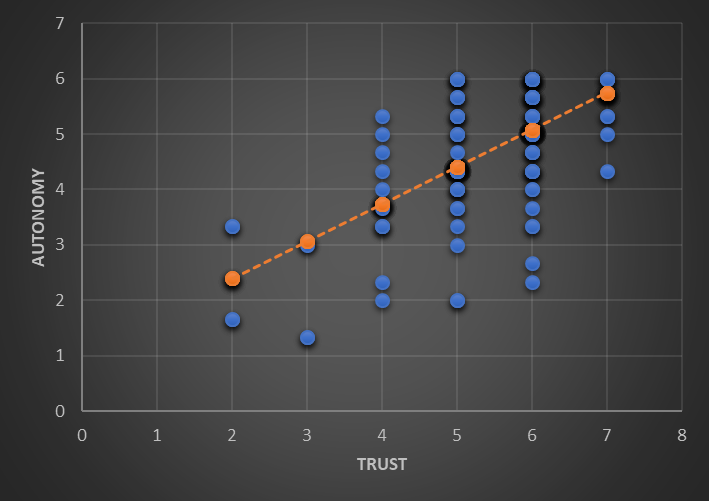
Figure 2
On the horizontal, teamwork front, the ability to hold a constructive disagreement is critical for creativity, productivity, and innovation. As Figure 3 shows, in a high-trust environment, participants reported being able to passionately disagree and still remain friends much more than in the low-trust environment. They also reported a much higher ability to disagree without having it become emotional or personal. Very few reported trying to avoid disagreements, and none (in the high-trust environment) reported being uncomfortable disagreeing with their peers, or that disagreements were typically unproductive in their company. The same was not true for low-trust environments, where quite a few participants reported that disagreements were unproductive, or that they didn’t feel comfortable disagreeing. On average, participants in high-trust organizations reported feeling 63.6% more comfortable arguing with their peers in a constructive and productive way.
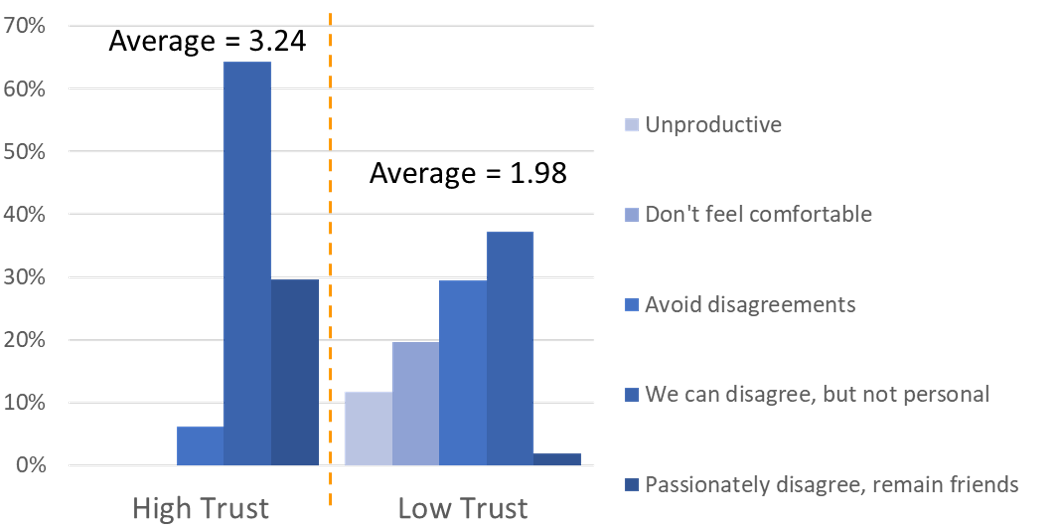
Figure 3
And there should be no surprise there. All three behaviors affecting the ability (and willingness) to argue constructively were reportedly much higher in the high-trust organization than in the low-trust organization. The willingness to be vulnerable with one another was 141% higher, the willingness to provide direct and honest feedback was 75% higher, and the receptivity to such feedback was 57% higher in the high-trust environments.
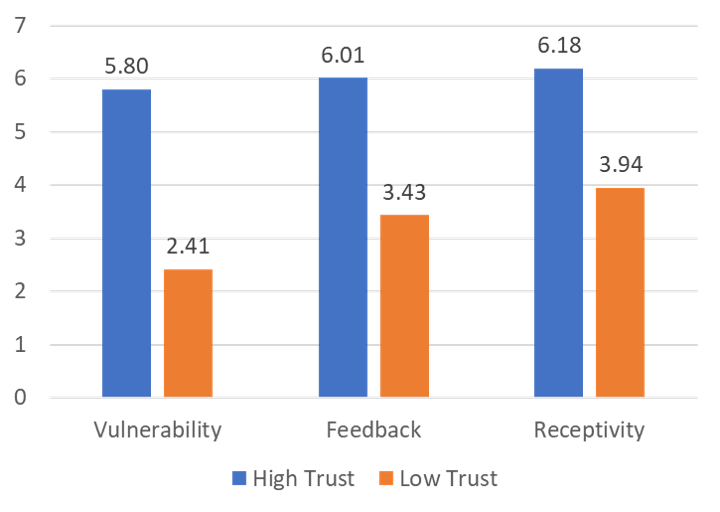
Figure 4
No doubt, you don’t have an innovation problem. You have a trust problem.
To see the level of trust in your organization, take the organizational trust quiz here.
The third and last article in this series will share the findings regarding the six elements of building trust, and how they affected the level of trust in the organization.
(Note: the author is the founder of the Innovation Culture Institute, LLC. Findings from additional research conducted by ICI will be included in the next parts of this article series).
Wait! Before you go…
Choose how you want the latest innovation content delivered to you:
- Daily — RSS Feed — Email — Twitter — Facebook — Linkedin Today
- Weekly — Email Newsletter — Free Magazine — Linkedin Group
 Dr. Yoram Solomon is an inventor, creativity researcher, coach, consultant, and trainer to large companies and employees. His Ph.D. examines why people are more creative in startup companies than in mature ones. Yoram was a professor of Technology and Industry Forecasting at the Institute for Innovation and Entrepreneurship, UT Dallas School of Management; is active in regional innovation and tech transfer; and is a speaker and author on predicting technology future and identifying opportunities for market disruption. Follow @yoram
Dr. Yoram Solomon is an inventor, creativity researcher, coach, consultant, and trainer to large companies and employees. His Ph.D. examines why people are more creative in startup companies than in mature ones. Yoram was a professor of Technology and Industry Forecasting at the Institute for Innovation and Entrepreneurship, UT Dallas School of Management; is active in regional innovation and tech transfer; and is a speaker and author on predicting technology future and identifying opportunities for market disruption. Follow @yoram
NEVER MISS ANOTHER NEWSLETTER!
LATEST BLOGS
How Brexit Has Affected UK E-commerce Businesses
Photo by Zyro on Unsplash The popularity of online shopping was already growing at an impressive rate – and…
Read MoreOvercoming range anxiety: three tips for EV owners
Photo by Jenny Ueberberg on Unsplash In the last few years, electric vehicles (EVs) have become more and more…
Read More
